|
|
|
Sort Order |
|
|
|
Items / Page
|
|
|
|
|
|
|
| Srl | Item |
| 1 |
ID:
075576
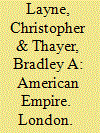

|
|
|
|
|
| Publication |
London, Routledge, 2007.
|
| Description |
ix, 152p.
|
| Standard Number |
0415952034
|
|
|
|
|
|
|
|
|
|
|
|
Copies: C:1/I:0,R:0,Q:0
Circulation
| Accession# | Call# | Current Location | Status | Policy | Location |
| 052088 | 327.1/LAY 052088 | Main | On Shelf | General | |
|
|
|
|
| 2 |
ID:
182000
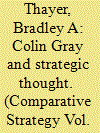

|
|
|
|
|
| Summary/Abstract |
The history of strategic thought is replete with contributors to the scholarly understanding of definitional issues of strategy and its application in various domains or to specific subjects. In any consideration of a strategic pantheon, Colin Gray ranks as a foremost strategist due to his contribution to the study of strategy from the perspective of theory, history, and policy. His contributions to strategy may be compared to Samuel Huntington’s in the related discipline of political science. As Huntington made a major impact in each subdiscipline of political science, so Gray’s contributions to strategy were comparable and thus define him as a major strategist: he developed a theory of strategy; analyzed strategy and conflict in a contemporary and historical context; made many contributions to nuclear and conventional strategy; helped to demarcate strategy as the object of scholarly study; and as a discipline to be taught. In each of these fields of study, Gray perceived what was generalizable over time and what was not.
|
|
|
|
|
|
|
|
|
|
|
|
|
|
|
|
| 3 |
ID:
061206
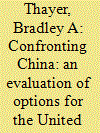

|
|
|
|
|
| Publication |
Jan-Mar 2005.
|
|
|
|
|
|
|
|
|
|
|
|
|
|
|
|
| 4 |
ID:
122402
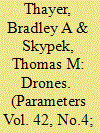

|
|
|
|
|
| Publication |
2012-13.
|
| Summary/Abstract |
The drone debate continues hot and heavy. Critical issues range
from the morality of targeting choices and concerns about unintended casualties and anti-Americanism to matters of legal and
bureaucratic oversight.1
These are pressing questions; the United States'
use of drones as a weapon of war is on the rise, and other countries are
interested in acquiring them.2
|
|
|
|
|
|
|
|
|
|
|
|
|
|
|
|
| 5 |
ID:
075254
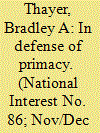

|
|
|
|
|
| Publication |
2006.
|
| Summary/Abstract |
Contrary to what Christopher Layne said in the last issue, the world is a long way away from seeing the end of U.S. primacy.
|
|
|
|
|
|
|
|
|
|
|
|
|
|
|
|
| 6 |
ID:
101889


|
|
|
| 7 |
ID:
146450
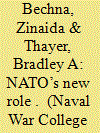

|
|
|
|
|
| Summary/Abstract |
Russia’s actions in Crimea and Ukraine have been momentous in their consequences for the North Atlantic Treaty Organization (NATO). Moscow has instilled new life in the almost seventy-year-old alliance. Doubts about its relevance and utility in the post–Cold War period have faded, at least for the time being, as leaders ponder what Russian leader Vladimir Putin will do next to challenge the alliance.
|
|
|
|
|
|
|
|
|
|
|
|
|
|
|
|
| 8 |
ID:
176579
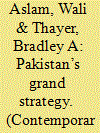

|
|
|
|
|
| Summary/Abstract |
This article is concerned with a significant grand strategic choice that Pakistan faces concerning its relations with China. The relationship between Pakistan and the United States has deteriorated since the US Special Forces found and killed Osama Bin Laden in the Pakistani city of Abbottabad in May 2011. Instead, Pakistan has been recalibrating its grand strategy enabling it to get closer to China. The country has received large Chinese investment to start several infrastructural projects in Pakistan as part of the Belt and Road Initiative. We argue that Pakistan is making a grave strategic mistake. Its partnership with China is unnatural and it will count against its core interests in the future. We suggest that Pakistan should reorient its grand strategy in order to bring it closer to Western democracies. Doing so will ensure greater security, economic development and sovereign independence for Pakistan.
|
|
|
|
|
|
|
|
|
|
|
|
|
|
|
|
| 9 |
ID:
122404
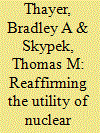

|
|
|
|
|
| Publication |
2012-13.
|
| Summary/Abstract |
A defining aspect of the present period in international politics is
the lack of attention paid to nuclear weapons by United States'
policymakers. To the extent these weapons are addressed, it is
to consider significant reductions in the size of the US nuclear arsenal,
to perhaps as few as 300 deployed strategic nuclear weapons, to advance
the administration's nuclear disarmament goal. This push for reductions
is part of a broader call for major reductions by organizations such as
Global Zero.1
We argue that such reductions are strategically risky, signal
weakness, and invite challenges from US foes and worry among US allies.
|
|
|
|
|
|
|
|
|
|
|
|
|
|
|
|
| 10 |
ID:
094412


|
|
|
|
|
| Publication |
2010.
|
| Summary/Abstract |
Theoretical insights from evolutionary psychology and biology can help academics and policymakers better understand both deep and proximate causes of Islamic suicide terrorism. The life sciences can contribute explanations that probe the influence of the following forces on the phenomenon of Islamic suicide terrorism: high levels of gender differentiation, the prevalence of polygyny, and the obstruction of marriage markets delaying marriage for young adult men in the modern Middle East. The influence of these forces has been left virtually unexplored in the social sciences, despite their presumptive application in this case. Life science explanations should be integrated with more conventional social science explanations, which include international anarchy, U.S. hegemony and presence in the Middle East, and culturally molded discourse sanctioning suicide terrorism in the Islamic context. Such a consilient approach, melding the explanatory power of the social and life sciences, offers greater insight into the causal context of Islamic fundamentalist suicide terrorism, the motivation of suicide terrorists, and effective approaches to subvert this form of terrorism.
|
|
|
|
|
|
|
|
|
|
|
|
|
|
|
|
| 11 |
ID:
083427
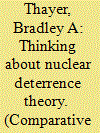

|
|
|
|
|
| Publication |
2007.
|
| Summary/Abstract |
For too long, nuclear deterrence theorists have remained apart from the revolution in the life sciences, and particularly evolutionary psychology, which has fundamentally changed the scientific understanding of the human mind. As a result of advances in evolutionary psychology, we now know that how the brain interprets actions and makes decisions is complicated, imperfect, greatly dependent upon emotions, and varied among humans. Consequently, it is fundamentally nave and dangerous to assume a similar outcome in deterrent situations when there is variation in cognition among leaders. The rational deterrence model's assumption of a universal rationality is irredeemably flawed and students of nuclear deterrence must replace it with a gradated understanding of rationality.
|
|
|
|
|
|
|
|
|
|
|
|
|
|
|
|
| 12 |
ID:
134069
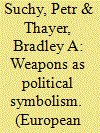

|
|
|
|
|
| Publication |
2014.
|
| Summary/Abstract |
This study evaluates the role of tactical nuclear weapons (TNWs) for NATO today. Historically, TNWs fulfill five objectives. First, they provide a deterrent by denial capability. Second, TNWs serve to deter TNWs by other countries. Third, as the most 'useable' of nuclear weapons, they offer militaries solutions to a small target set of hardened targets. Fourth, they bridge the interface between nuclear and conventional forces, maintaining linkage up the ladder of escalation. Fifth, they serve as a powerful political symbol of an extended deterrent commitment. While the perception is that their utility for NATO in plausible European contingencies is low, we argue that there is variation in the political and military roles of TNWs. We submit that, in general, the first role has lost its significance but the other objectives remain relevant to NATO's present political circumstances, especially as a symbol of the transatlantic relationship and as a safeguard against Russian belligerence. Accordingly, TNWs remain a significant part of NATO's capabilities and should remain deployed in Europe.
|
|
|
|
|
|
|
|
|
|
|
|
|
|
|
|
|
|
|
|
|